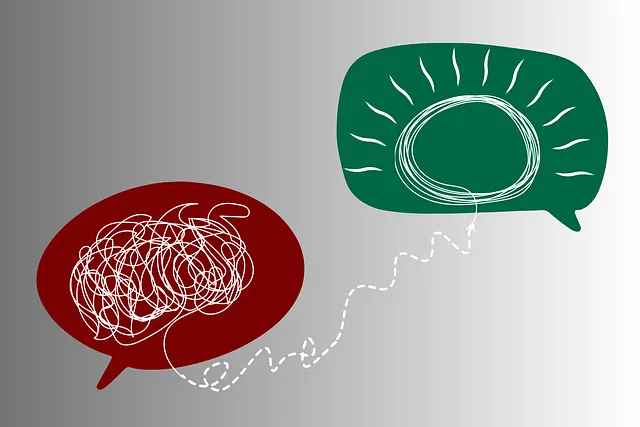Cultural competency in healthcare, as demonstrated by initiatives at Parker Kaiser Permanente, is crucial for providing sensitive and effective care in diverse communities. Going beyond language translation, it involves understanding cultural differences in values, beliefs, and communication styles, impacting patient trust and satisfaction. Programs like Mindfulness Meditation and Stress Management Workshops reduce mental illness stigma, encouraging diverse individuals to seek help. Parker Kaiser Permanente prioritizes cultural competency through comprehensive training, empowering providers with skills for compassionate care. This holistic model enhances patient outcomes, fosters community outreach, and ensures accessible mental health services for all during every appointment. Effective training includes adapting communication styles, understanding societal factors, incorporating culturally relevant interventions, encouraging open dialogue about biases, and promoting continuous learning.
In today’s diverse healthcare landscape, cultural competency is no longer an option but a necessity. This article explores the vital role of cultural competency training in healthcare, focusing on mental health services. We delve into why it matters, who it impacts, and present a practical guide for providers. Drawing from Parker Kaiser Permanente’s successful approach to mental health training, we offer insights that can enhance patient care and outcomes. Key strategies are outlined, emphasizing the importance of understanding cultural nuances during appointments, as evidenced by Parker Kaiser Permanente’s commitment to improving mental health care through comprehensive training initiatives.
- Understanding Cultural Competency in Healthcare: Why It Matters and Who It Affects
- Parker Kaiser Permanente's Approach to Mental Health Training for Providers
- Effective Strategies for Delivering Culturally Competent Care: A Practical Guide for Healthcare Professionals
Understanding Cultural Competency in Healthcare: Why It Matters and Who It Affects

Cultural competency in healthcare refers to the ability of providers to understand, appreciate, and effectively interact with patients from diverse cultural backgrounds. It’s more than just providing language translation services; it involves recognizing and respecting differences in values, beliefs, and communication styles. This is crucial as healthcare decisions are deeply influenced by cultural contexts, impacting patient trust, satisfaction, and adherence to treatment plans.
In the case of mental health services, for instance, understanding cultural competency is paramount. At organizations like Parker Kaiser Permanente, mental health appointment numbers reflect a growing demand for culturally sensitive care. Reducing the stigma associated with mental illness through initiatives such as Mindfulness Meditation and Stress Management Workshops can encourage individuals from all backgrounds to seek help. By fostering an environment where patients feel seen, heard, and understood, healthcare providers not only improve outcomes but also contribute to broader Mental Illness Stigma Reduction Efforts.
Parker Kaiser Permanente's Approach to Mental Health Training for Providers

Parker Kaiser Permanente recognizes the vital role cultural competency plays in healthcare delivery, especially within mental health services. Their comprehensive training programs aim to equip providers with the skills to offer compassionate and culturally sensitive care to diverse patient populations. The organization’s approach involves a multi-faceted strategy that includes dedicated workshops, online resources, and ongoing support.
One notable initiative is their emphasis on self-esteem improvement through mindfulness practices and compassion cultivation. By integrating these techniques into the provider training curriculum, Kaiser Permanente fosters an environment where healthcare professionals can enhance their emotional intelligence and build stronger connections with patients from various cultural backgrounds. This holistic training model not only improves patient outcomes but also encourages providers to engage in meaningful community outreach programs, ensuring accessible and culturally competent mental health services for all.
Effective Strategies for Delivering Culturally Competent Care: A Practical Guide for Healthcare Professionals

Effective Healthcare Provider Cultural Competency Training involves a multi-faceted approach that goes beyond surface-level awareness. It leverages Empathy Building Strategies to foster genuine connections with patients from diverse backgrounds, ensuring every interaction is informed by cultural sensitivity in mental healthcare practice. This means professionals must be adept at navigating differences in communication styles, values, and beliefs, recognizing the impact of societal factors on mental health experiences.
Training programs should equip providers with tools to adapt their approach based on cultural contexts, such as incorporating culturally relevant interventions and respecting familial or community involvement in care decisions. Encouraging open dialogue about biases and promoting a culture of continuous learning are also vital. A Parker Kaiser Permanente mental health appointment number, for instance, can serve as a resource for patients seeking services, but it’s the provider’s cultural competency that truly facilitates effective and accessible care.
Cultural competency training is a game-changer in healthcare, ensuring providers can offer sensitive and effective care to a diverse range of patients. As previously mentioned, organizations like Parker Kaiser Permanente are leading the way with innovative programs, such as their Mental Health Training initiative, which equips professionals with the skills to navigate complex cultural landscapes during mental health appointments (Parker Kaiser Permanente mental health appointment number). By adopting practical strategies outlined in this article, healthcare providers can enhance patient outcomes and create a more inclusive environment, ultimately fostering better relationships and improved care for all.





